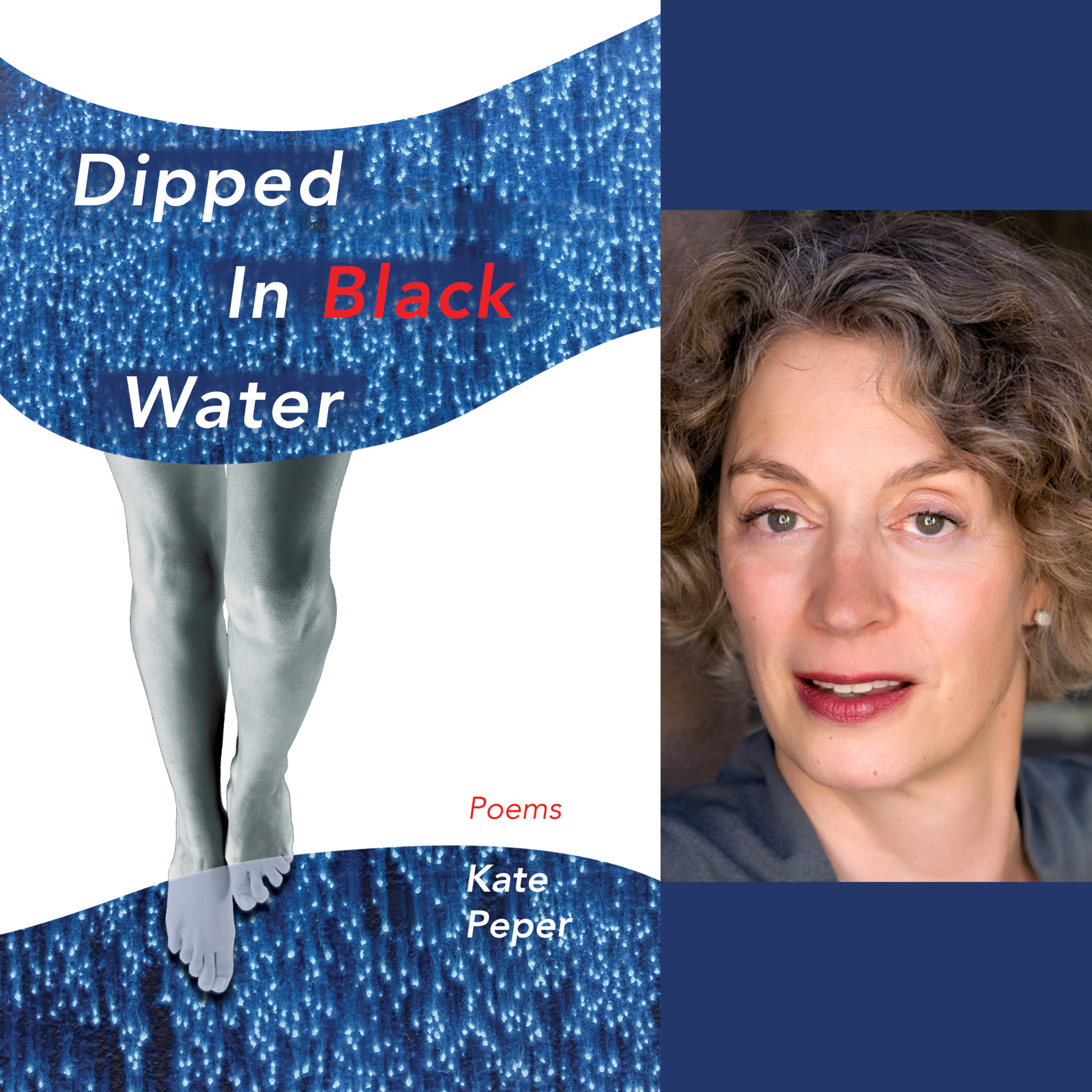An exciting new voice in poetry. Dipped in Black Water is a book full of wisdom, compassion, and vitality. Peper writes with verve and a delight in language, and her exact descriptions and surprising images—having a religious experience in Ikea, breaking up with a lover while watching a dead dog float down the Mississippi River —catch us off balance, wake us up, and make us see.
–Ellery Akers, author of Practicing the Truth
Mother, father, daughter and also the past and the present are woven into this compelling book. Kate Peper‘s poems are both sharp and intimate as she writes about nature, human nature, and science. In many of these poems, her focus is on loss and on medical imperfections of the body, including her own. Yet still, always, her work has light, hope, and a sense of the triumph of the spirit. “Happiness, stay next to me,” Peper writes. It does, and reading her poems helps happiness stay near me, too.
–Susan Terris, Ghost of Yesterday
Dipped in Black Water arrives steeped in the fascination—you could almost call it Gothic—with deviations from the norm, particularly the exotic imperfections of the body. The anomalous, the freakish, the rejected, the doomed—”the dark thing in the corner”—are the figures by which Kate Peper measures her own flaws and empathy and mortality and, especially, resilient spirit. After a deeply unsettling diagnosis, she articulates a kind of prayer: “Happiness, stay next to me//See, I’ve made a place for you on the bench,/where the cherry petals fall slowly.” Beauty and terror (and gratefully, humor) abide in these poems in a kind of uneasy yet enduring equilibrium the reader does not soon forget.
–Thomas Centolella, Winner 2015 Dorset Prize for his manuscript, Almost Human, to be published in 2017 by Tupelo Press







Katy Giebenhain –
In her new chapbook Kate Peper brings us explorations of what is and is not in our control. Dipped in Black Water is sharp and compassionate. Instead of a voice, I would say Peper’s writing has a pulse. And the pulse in each of these poems is strong and steady.
These poems are characterized by a welcome straightforwardness. They are nearly clinical in a way that is playful – clinical in the best sense: observant, unafraid of questions and without judgement. From “The Serial Killer’s Parents, Afterward” to “Textbook of Pathology” to the timeless layers of loss in “End Of The Line” to “Stone Baby” where “God’s lamp shone here / and still does” the poems do not skirt bittersweet realities. They engage. They name.
Readers will come away thinking differently of the Wall Street bull, the RCA terrier and the chromosomes that comprise us all. “View from the Jungfaujoch Railway Café” took my breath away. Peper knows she doesn’t need to add drama. She holds a situation for us and the drama is already there. She does not distract or exaggerate. This is a mature restraint. Dipped in Black Water is a well-written, lively collection.
Rebecca Foust –
https://womensvoicesforchange.org/poetry-sunday-end-of-the-line-by-kate-peper.htm
Alexis Rhone Fancher –
DIPPED IN BLACK WATER, Kate Peper (Finishing Line Press, Georgetown KY 15)
This brave and extraordinary chapbook,New Women’s Voice Series 2016 Winner, took me on a ride from the first poem, and wouldn’t let go. Not since reading Jillian Weise’s The Amputee’s Guide To Sex (2007) have I read such naked, exquisite work. Peper, born with a medical condition that precludes conception, explores every aspect of her “imperfection” in poems which range from dark to brilliant. At eighteen, I learned/I couldn’t have children, she writes, in End Of The Line.
On a plastic torso the doctor
covered the uterus and vagina
with his palm and said,
These parts are missing…
Peper skillfully weaves tales of her family history with stories of her own resilience. As someone who has known loss and battled my own deficiencies, I was thrilled to go on this hopeful, life-affirming journey with her. A remarkable achievement. Read this book!
ALEXIS RHONE FANCHER
Cathryn Shea (verified owner) –
Kate Peper’s voice in her chapbook “Dipped in Black Water” has been described as a pulse. The description is apt given her skill at using imagery, sound, and emotion to deliver a breathtaking collection that explores loss, redemption, and the challenges of a rare clinical diagnosis that intertwines with femaleness and motherhood. This is a book to cherish and keep near to read over and over.